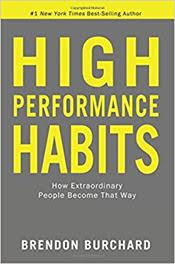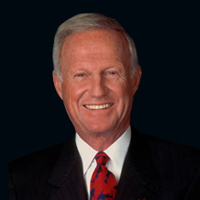|
Harvey Mackay's weekly nationally
syndicated column
Develop High Performance Habits
Are you performing up
to your potential? Are you afraid to jump to the next level?
Are your habits pushing you forward or holding you back?
The most important
book on self-motivation and achieving more than you imagined hit the bookstores
last week: "High Performance Habits: How Extraordinary
People Become That Way," by Brendon Burchard.
Brendon is the world's
leading high performance coach and a sought-after personal development
trainer. Drawing inspiration from Stephen Covey's "Seven Habits
of Highly Successful People," which he describes as "the best
book of all time," Brendon was determined to answer three questions:
1. Why do some individuals and teams succeed more quickly than
others and sustain that success over the long term?
2. Of those who pull it off, why are some miserable and others
consistently happy on their journey?
3.
What motivates
people to reach for higher levels of success in the first place, and what
practices help them improve the most?
I've heard Brendon
speak on several occasions, so I invited him to speak to my Roundtable
group about his results. "The right habits lead to sustained
long-term success. High performance means succeeding beyond standard
norms, consistently over the long-term," Brendon explained.
"It feels like full engagement, joy and confidence that come from
giving your absolute best.
"What we know
about high performers," he said, includes the following:
- They
are more successful than their peers, yet they are less stressed.
- They
are more confident that they will achieve goals despite adversity.
- They
are uniquely productive ... They've mastered prolific quality output.
- They
work passionately, regardless of traditional rewards.
- They
are admired and adaptive leaders.
- They
are healthier than peers.
- They
feel appreciated and feel their work makes a difference.
Shockingly, just fewer
than 15 percent of the population are high performers.
Years of research led
him to identify the six deliberate habits that gave people the edge.
He also discovered that anyone can practice these habits with extraordinary
results in their lives, relationships and careers. "High
performance is not strongly correlated with age, gender, nationality, intelligence,
personality, strengths, creativity, empathy, years of experience or
compensation," he said.
Brendon sites six
habits in a long-term success story:
Seek clarity. "Compared
with their peers, high performers have more clarity on who they are, what
they want, how to get it and what they find meaningful and
fulfilling," he said.
"You generate
clarity by asking questions, researching, trying new things, sorting through
life's opportunities, and sniffing out what's right for you. It comes
from asking yourself questions and further refining your perspective on
life."
Generate
energy.. "I've found that the most effective way to help high
performers increase their energy is to teach them to master
transitions," which he defines as "a powerful space of freedom
between activities. . . . I'm convinced that if we can get you to change
the way you shift from one activity to the next, we can revitalize your life."
Raise
necessity.. "Necessity is the emotional drive that makes great
performance a must instead of a preference," he explained.
"When you feel necessity, you don't sit around wishing or
hoping. You get things done." He continued, "If I've
learned anything from my research and a decade of interventions developing
high performers, it's that you cannot become extraordinary without a sense
that it's absolutely necessary to excel."
Increase
productivity. "The fundamentals of becoming more productive are
setting goals and maintaining energy and focus," he said. Clear
and challenging goals are the starting point. Taking care of
yourself, including good sleep, nutrition, exercise and positive emotions
help you maintain energy. Keeping focused isn't easy in the modern
era with information overload, distractions and interruptions diminishing
productivity.
Develop
influence. "Having influence means you can get people to believe
in you or your ideas, buy from you, follow you, or take actions that you request
of them," he explained. "Of course, influence is a two-way
street."
Demonstrate courage. "Our
coaching interventions suggest that demonstrating courage is the
cornerstone habit of high performance," Brendon said.
"Demonstrating courage doesn't mean you have to save the world or do
something grandiose. Sometimes, it means taking a first step toward
real change in an unpredictable world."
Brendon offers
specific examples that illustrate how to develop these habits as well as
exercises and practices for achieving high performance status. He
even offers a link to a free professional assessment. Get ready to up
your game.
Mackay's Moral: The biggest room in
the world is the room for improvement.
Harvey Mackay, Founder
"The biggest room in
the world is
the room for improvement."
|








No comments:
Post a Comment